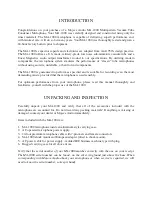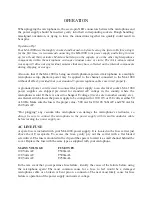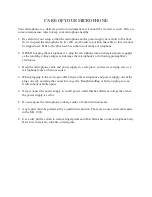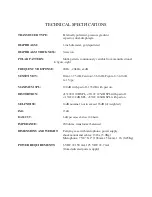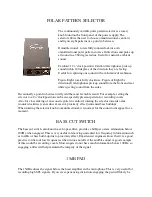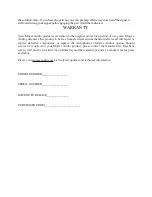
OPERATION
When plugging the microphone in, the seven-pin XLR connectors between the microphone and
the power supply should be inserted
gently
into their corresponding sockets. Rough handling,
misaligned orientation, or trying to force the connections together too quickly could result in
bent pins.
Operation Tip!
Your MA-1000 was thoroughly checked and burned-in before leaving the factory. Before using it
for the first time, we recommend connecting the MA-1000 to its power supply and letting it warm
up for at least thirty minutes. Moisture build-up on the capsule or on the other high-impedance
components within the microphone can cause random noise or static. The thirty-minute initial
warm-up will drive out any residual moisture that may have collected on the internal components
during shipping or storage.
Also note that if the MA-1000 is being used with phantom powered microphones in a multiple
microphone setup, phantom power may be applied to the channel connected to the MA-1000
without ill effect,
provided that your standard 3-pin microphone cables are wired properly.
A grounded power cord is used to connect the power supply to an electrical socket. MA-1000
power supplies are shipped pre-wired for standard AC voltage in the country where the
microphone is sold. If there is a need to change AC voltage (travel, sale to another country, etc.),
an external switch allows the power supply to be configured for 100, 115 or 230 volts at either 50
or 60 Hz. Make sure the fuse is the proper value - 500 mA for 100-120 Volts AC and 250 mA for
230 Volts AC.
"Hot plugging" any vacuum tube microphone can damage the microphone’s electronics,
so
always be sure to connect the microphone to the power supply with its multi-conductor cable
before turning the power supply on.
AC LINE FUSE
A spare fuse is included with your MA-1000 power supply. It is located in the fuse carrier just
above the AC receptacle. To access the fuse, gently pry out the carrier with a flat bladed
screwdriver. The fuse is mounted in the clip and the spare is located is a small channel behind the
cover. Replace the fuse with the same type as supplied with your microphone.
MAINS VOLTAGE
FUSE TYPE
100 Volts AC
T500mAL
120 Volts AC
T500mAL
220 Volts AC
T250mAL
In the rare event that you experience fuse failure, identify the cause of the failure before using
the microphone again! The most common cause for a fuse to fail would be a damaged
microphone cable or a broken or bent pin on a connector. The next most likely cause for fuse
failure is operation of the power supply on incorrect voltage.


